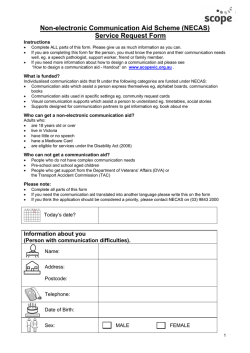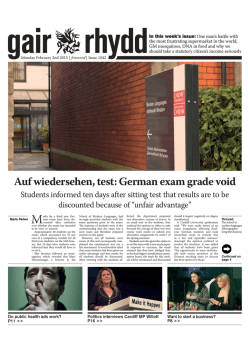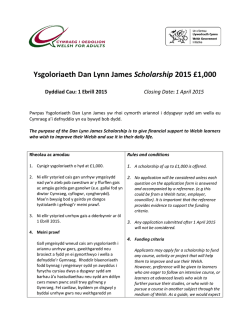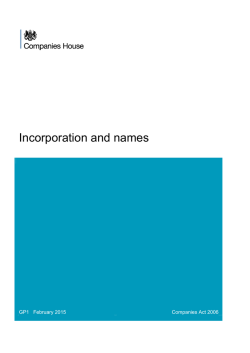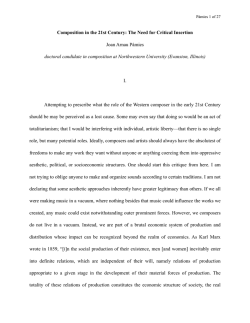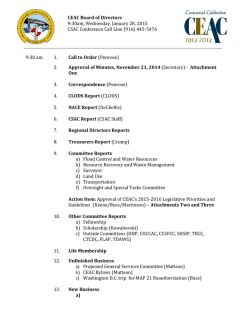
Report - National Assembly for Wales
National Assembly for Wales Health and Social Care Committee 29 January 2015 Report on the Legislative Consent Memorandum for the Medical Innovation Bill The Medical Innovation Bill Background 1. The Medical Innovation Bill (“the Bill”) is a Private Members’ Bill introduced in the House of Lords by Lord Saatchi on 6 June 2014. The stated purpose of the Bill is to encourage responsible innovation in medical treatment.1 In particular, it will not be negligent for a doctor to depart from accepted medical treatments for a condition if the decision to do so is taken responsibly. In his submission to the Committee’s consultation, Lord Saatchi stated that: “the purpose of the Bill is to give doctors and patients clarity at the point of treatment about what amounts to a responsible and lawful approach to innovation in medical treatment”.2 2. The Bill’s House of Lords Report Stage concluded on 12 December 2014. This report takes account of the Bill as amended at Report Stage. Further amendments may be made at Third Reading in the House of Lords,3 or when the Bill moves to the House of Commons stages. Main effect of the provisions in the Bill for which consent is sought 3. Clause 1 of the Bill as amended at Report Stage states that the purpose of the Bill is to encourage responsible innovation in medical treatment. In taking a responsible decision to depart from accepted medical treatments for a condition, a doctor must: – obtain the views of at least one appropriately qualified doctor; – take full account of those views; – obtain any relevant consents; – consider: Medical Innovation Bill [HL], Bill 70 2014-15 National Assembly for Wales, Health and Social Care Committee, Consultation response MIB04 The Lord Saatchi 3 Third Reading in the House of Lords will take place on Friday 23 January. 1 2 1 opinions or requests expressed by, or in relation to, the patient; the risks and benefits; any other matter relevant to reaching a clinical judgement; and – take any other steps to secure the decision is made in an accountable and transparent way. 4. Clause 1 further provides that: – the steps taken by the doctor must include recording in the patient’s notes the views obtained, the decision to depart from the existing range of accepted medical treatments, and the proposed treatment; – the Bill does not apply to treatment carried out solely for cosmetic purposes, and may only be used to further the best interests of the patient. The Bill cannot, therefore, be used for other purposes, such as research. 5. Clause 2 of the Bill as amended at Report Stage clarifies that the common law4 relating to departure from acceptable medical treatments remains unchanged. The common law position is that departure from acceptable medical treatments will not amount to negligence provided that the decision is supported by a responsible body of medical opinion. A doctor would therefore be able to depart from an existing range of medical treatments either under the provisions of the Bill, or in reliance on the common law. 6. Clause 3 of the Bill as amended at Report Stage provides that the provisions of the Bill would come into force by regulations made by the Secretary of State. 7. The provisions in the Bill as amended at Report Stage in the House of Lords apply to England and Wales. The Bill does not confer any powers to make subordinate legislation on Welsh Ministers. 4 i.e. case law developed by judges in the courts of England and Wales over the years. 2 Legislative consent Background 8. In accordance with the National Assembly for Wales’s Standing Order 29, when a UK Bill contains provisions (either on introduction or as a consequence of amendments tabled) that fall within – or modify – the Assembly’s legislative competence, the Welsh Government must lay a legislative consent memorandum (“LCM”). LCMs must summarise the policy objectives of a Bill, specify the extent to which a Bill makes (or would make) relevant provision, and explain whether it is considered appropriate for that provision to be made. 9. When an LCM is laid, the Business Committee must normally refer it for committee consideration, outlining the timetable within which the relevant committee should report. 10. The Welsh Government laid an LCM in relation to the Bill on 10 December 2014.5 The Business Committee considered the LCM on 13 January 2015, and referred it to the Health and Social Care Committee (“the Committee”) for consideration with a reporting deadline of 29 January 2015. The LCM is due to be debated in Plenary on 3 February 2015. The legislative consent memorandum 11. The Welsh Government states in the LCM that in its view: “the purpose of the Bill is to encourage the development and use of new medical treatments for illness etc. and therefore to achieve more effective health care services, by aiming to address any concerns doctors may have that they may be sued successfully in negligence if they use novel treatments responsibly”.6 12. The Welsh Government therefore believes that the provisions in the Bill fall within the Assembly’s legislative competence, as they relate to the treatment and alleviation of disease, illness, injury, disability and mental disorder; provision of health services; clinical governance and standards of National Assembly for Wales, LCM-LD10045 Legislative Consent Memorandum Medical Innovation Bill, 10 December 2014 6 Ibid 5 3 health care under paragraph 9 of Part 1, Schedule 7 to the Government of Wales Act 2006.7 13. Conversely, during the House of Lords Committee Stage, Earl Howe, the Parliamentary Under-Secretary of State for the Department of Health, said: “The operative provisions of the Bill relate entirely to modifying the law of tort, which is a reserved matter. The Bill can fairly and realistically be classified as relating to a non-devolved subject, and therefore not within the competence of the National Assembly for Wales”.8 14. In his response to the Committee’s consultation, Lord Saatchi acknowledged the differing views of the UK and Welsh Governments in respect of whether an LCM was required.9 Committee consideration of the LCM 15. The Committee issued a targeted and general call for evidence in relation to the LCM on 16 December 2014. A list of those who responded is included at Annex A. The consultation period was necessarily short to ensure that the Committee could take account of stakeholders’ views in its consideration of the LCM, and the Committee is grateful to those who responded. Evidence received 16. While generally supportive of appropriate medical innovation where the doctor and patient agree that it is in the patient’s best interests, the majority of those who responded to the Committee’s consultation opposed the Bill, either in principle or as it is currently drafted. 17. The Royal College of Physicians (Wales) stated that it supported the aims of the Bill, but not the Bill as currently drafted. It expressed concern that the Bill does not provide for the mandatory central reporting of the results of innovative treatments. In its view, this would hinder good practice sharing and the prevention of irresponsible innovation, and risk undermining National Assembly for Wales, LCM-LD10045 Legislative Consent Memorandum Medical Innovation Bill, 10 December 2014 8 HL Deb 24 October 2014 vol756 col915 9 National Assembly for Wales, Health and Social Care Committee, Consultation response MIB04 The Lord Saatchi 7 4 the accountability of the innovation process.10 The Patients Association also highlighted concerns about the accountability of decisions to innovate. It said that, as drafted, the Bill does not provide sufficient clarity about accountability for decisions taken during and after treatment, particularly in relation to frail, elderly or vulnerable patients.11 18. In the LCM, the Welsh Government states that the British Medical Association believes that the Bill could create confusion, and that a number of medical research and charitable bodies have: “questioned the necessity and practicality of further legislation as a means of encouraging innovation”.12 19. In response to the Committee’s consultation, the Royal College of Radiologists13 and the Medical Defence Union14 said that the Bill was unnecessary. In their view, the current law and ethical guidance is clear and does not constrain appropriate medical innovation. 20. Specific concerns raised by stakeholders included: – the removal of protections for “patients from inappropriate experimentation” and “doctors from pressure to innovate in ways which are potentially detrimental to their patients”;15 – the risk of “exposing vulnerable and desperate patients to false hope, futile and potentially harmful (and expensive) treatments” as the result of a relaxation of existing governance mechanisms;16 – difficulties in ensuring that the Bill’s provisions were consistently and uniformly applied “across clinical conditions, patient groups and geographical areas to avoid variations in the quality of care”;17 and National Assembly for Wales, Health and Social Care Committee, Consultation response, MIB06 Royal College of Physicians (Wales) 11 Ibid, MIB02 The Patients Association 12 National Assembly for Wales, LCM-LD10045 Legislative Consent Memorandum Medical Innovation Bill, 10 December 2014. The LCM references a briefing prepared for the House of Lords Committee Stage by the British Medical Association, and a joint briefing prepared by the Academy of Medical Sciences, the Association of Medical Research Charities, the Wellcome Trust, the Medical Research Council, Parkinson’s UK, Leukaemia & Lymphoma Research, Arthritis Research UK, the Motor Neurone Disease Association and the British Heart Foundation. 13 National Assembly for Wales, Health and Social Care Committee, Consultation response MIB01 Royal College of Radiologists 14 Ibid, MIB03 Medical Defence Union 15 Ibid, MIB01 Royal College of Radiologists 16 Ibid, MIB01 Royal College of Radiologists 17 Ibid, MIB02 The Patients Association 10 5 – the risk of introducing “confusion and delay in circumstances where they do not currently exist”.18 Lord Saatchi’s view 21. In his response to the Committee’s consultation, Lord Saatchi (the Bill’s sponsor) said that a consultation run by the Department of Health in 201314 had received over 20,000 responses in support of the Bill. He acknowledged that there had been some opposition to the Bill, but said that many of the concerns raised had been resolved by amendments “tabled or to be tabled in the Lords”.19 He stated that: “Support for the Bill in the case of a number of organisations is conditional upon the Bill being amended to include provision for compulsory registration of the results of innovative treatment, positive and negative”.20 22. The Bill provides for the recording of particular information in the individual patient’s notes. It does not currently make provision for central recording or registration of the results of innovative treatment.21 Lord Saatchi states in his consultation response that he would be: “strongly in favour of provision of that kind, which could result in the Bill being a major advance in the world of medical research. […] Although structurally secondary to the primary purpose of the Bill – providing certainty and clarity in relation to responsible decisions to innovate – the creation of the database could be of at least equal practical importance for patients”.22 The Welsh Government’s view 23. The LCM states that the Welsh Government has concerns about the application of the provisions within the Bill to Wales, and that prior to tabling a legislative consent motion, and determining whether or not to promote it, National Assembly for Wales, Health and Social Care Committee, Consultation response MIB03 Medical Defence Union 19 Ibid, MIB04 The Lord Saatchi 20 Ibid 21 An amendment has been tabled by Lord Hunt of Kings Heath for consideration at Third Reading which seeks to require the doctor to comply with a scheme for capturing the results of innovative treatment. 22 Ibid 18 6 the Welsh Government is undertaking further discussions with the Department of Health.23 24. The Committee wrote to the Minister for Health and Social Services on 13 January 2015 seeking an update on the discussions with the Department of Health (attached at Annex B). In a letter to the Chair (attached at Annex C), the Minister indicated that discussions between officials from the Welsh Government and the Department of Health have not addressed his concerns. He states that: “Having taken further advice from the Deputy Chief Medical Officer I remain of the view that the Bill is not necessary, and is not consistent with the fundamental principles which we wish to drive improvements in NHS Wales”.24 The Committee’s view Legislative competence 25. As set out above, Earl Howe indicated during the House of Lords Committee Stage that the UK Government considers that the Bill relates “entirely to modifying the law of tort, which is a reserved matter”. 25 However, the test for determining whether legislation is within the legislative competence of the Assembly is to consider whether the legislation relates to a devolved subject and whether any exceptions apply. The Supreme Court, in its judgment on the Agricultural Sector (Wales) Bill in July 2014, clarified that the test of whether the provisions of a Bill fall within the legislative competence of the Assembly is simply whether those provisions relate to a devolved subject. Therefore, it is not relevant that tort is not a devolved subject. 26. In the view of the Committee, the Bill relates to the devolved subject of health, specifically the treatment and alleviation of disease, illness, injury, disability and mental disorder; provision of health services; clinical governance and standards of health. Neither medical innovation nor the law of tort are exceptions under Schedule 7 to the Government of Wales Act 2006, and therefore no relevant exceptions apply. National Assembly for Wales, LCM-LD10045 Legislative Consent Memorandum Medical Innovation Bill, 10 December 2014 24 Letter from the Minister for Health and Social Services to the Chair of the Health and Social Care Committee, 21 January 2015 25 HL Deb 24 October 2014 vol756 col915 23 7 27. The Committee is of the opinion that the provisions in the Bill as currently drafted fall within the legislative competence of the Assembly. Therefore, it agrees with the Welsh Government that a legislative consent motion is required. Legislative consent 28. The short timescales available and the other work in the Committee’s programme, have meant that the Committee has not been able to undertake a detailed piece of work on this occasion. However, the Committee wishes to draw to the Assembly’s attention the concerns raised by the majority of those who responded to its consultation. Some of these concerns echo the stakeholder concerns summarised by the Welsh Government in the LCM about whether the Bill is required, and whether it could create unnecessary confusion and uncertainty; others, while in favour of the aims of the Bill, question whether the Bill as drafted would achieve those aims. 29. It is important that patients are able to benefit from appropriate innovative treatments where it is in their best interests to do so, but on the basis of the evidence available to date, the Committee is not yet persuaded that this Bill would achieve its stated aim of encouraging such innovation. The Committee is therefore not yet persuaded that the Bill is an appropriate legislative vehicle to achieve its stated aims. 8 Annex A – written evidence The following people and organisations provided written evidence to the Committee. All consultation responses can be viewed in full on the Committee’s website. Organisation Reference Royal College of Radiologists MIB01 The Patients Association MIB02 Medical Defence Union MIB03 The Lord Saatchi MIB04 Royal College of Physicians (Wales) MIB05 Dr Anthony Barton, Solicitor and Medical Practitioner MIB06 9 Annex B – letter to the Minister for Health and Social Services Y Pwyllgor Iechyd a Gofal Cymdeithasol Health and Social Care Committee Mark Drakeford AM Minister for Health and Social Services 13 January 2015 Dear Mark, As you will be aware, Business Committee has this morning referred the legislative consent memorandum in relation to the Medical Innovation Bill to the Health and Social Care Committee for consideration, with a reporting deadline of 29 January 2015. I note from the legislative consent memorandum that you have some concerns about the provisions of the Bill applying to Wales. I also note that you are in discussion with the UK Department of Health about the implications of the amendments made to the Bill at Committee and Report Stages, and whether they provide sufficient safeguards for patients. The Committee will be considering the legislative consent memorandum at its meeting on Wednesday 21 January. It would be helpful to the Committee’s consideration if you could provide an update on your discussions with the Department of Health, and indicate whether your concerns about the application of the provisions in the Bill to Wales have been allayed, by Monday 19 January 2015. Yours sincerely, David Rees AM Chair, Health and Social Care Committee 10 Annex C – letter from the Minister for Health and Social Services
© Copyright 2026



